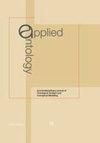An ontology for maintenance procedure documentation
IF 2.5
4区 计算机科学
Q3 COMPUTER SCIENCE, ARTIFICIAL INTELLIGENCE
引用次数: 1
Abstract
In mining, manufacturing and industrial process industries, maintenance procedures are used as an aid to guide technicians through complex manual tasks. These procedures are not machine-readable, and cannot support reasoning in digitally integrated manufacturing systems. Procedure documents contain unstructured text and are stored in a variety of formats. The aim of this work is to query information held in real industrial maintenance procedures. To achieve this, we develop an ontology for maintenance procedures using the OWL 2 description language. We leverage classes and object properties from the ISO 15926 Part 14 Upper Ontology and create a domain ontology. The key contribution of this paper is a demonstration of trade-offs required when modelling an existing engineering artifact, where an abstraction of its contents is given a-priori. We provide an ontologically rigorous abstraction of notions captured in procedure documentation to a set of classes, relations and axioms that allow reasoning over the contents. Validation of the ontology is performed via a series of competency questions based on queries relevant to technicians, engineers and schedulers in industry. The ontology is applied to real world maintenance procedures from two industrial organisations.维护过程文档的本体
在采矿业、制造业和工业加工行业,维护程序被用作指导技术人员完成复杂手工任务的辅助手段。这些程序不是机器可读的,不能支持数字集成制造系统中的推理。过程文档包含非结构化文本,并以各种格式存储。本工作的目的是查询实际工业维护过程中保存的信息。为了实现这一点,我们使用owl2描述语言为维护过程开发了一个本体。我们利用ISO 15926 Part 14 Upper Ontology中的类和对象属性,创建一个领域本体。本文的关键贡献是在对现有工程工件建模时所需要的权衡的演示,其中先验地给出了其内容的抽象。我们将过程文档中捕获的概念在本体论上严格抽象为一组类、关系和公理,允许对内容进行推理。本体的验证是通过一系列基于与工业中的技术人员、工程师和调度人员相关的查询的能力问题来执行的。本体应用于两个工业组织的实际维护过程。
本文章由计算机程序翻译,如有差异,请以英文原文为准。
求助全文
约1分钟内获得全文
求助全文
来源期刊

Applied Ontology
COMPUTER SCIENCE, ARTIFICIAL INTELLIGENCE-COMPUTER SCIENCE, INFORMATION SYSTEMS
CiteScore
4.80
自引率
30.00%
发文量
15
审稿时长
>12 weeks
期刊介绍:
Applied Ontology focuses on information content in its broadest sense. As the subtitle makes clear, two broad kinds of content-based research activities are envisioned: ontological analysis and conceptual modeling. The former includes any attempt to investigate the nature and structure of a domain of interest using rigorous philosophical or logical tools; the latter concerns the cognitive and linguistic structures we use to model the world, as well as the various analysis tools and methodologies we adopt for producing useful computational models, such as information systems schemes or knowledge structures. Applied Ontology is the first journal with explicit and exclusive focus on ontological analysis and conceptual modeling under an interdisciplinary view. It aims to establish a unique niche in the realm of scientific journals by carefully avoiding unnecessary duplication with discipline-oriented journals. For this reason, authors will be encouraged to use language that will be intelligible also to those outside their specific sector of expertise, and the review process will be tailored to this end. For example, authors of theoretical contributions will be encouraged to show the relevance of their theory for applications, while authors of more technological papers will be encouraged to show the relevance of a well-founded theoretical perspective. Moreover, the journal will publish papers focusing on representation languages or algorithms only where these address relevant content issues, whether at the level of practical application or of theoretical understanding. Similarly, it will publish descriptions of tools or implemented systems only where a contribution to the practice of ontological analysis and conceptual modeling is clearly established.
 求助内容:
求助内容: 应助结果提醒方式:
应助结果提醒方式:


